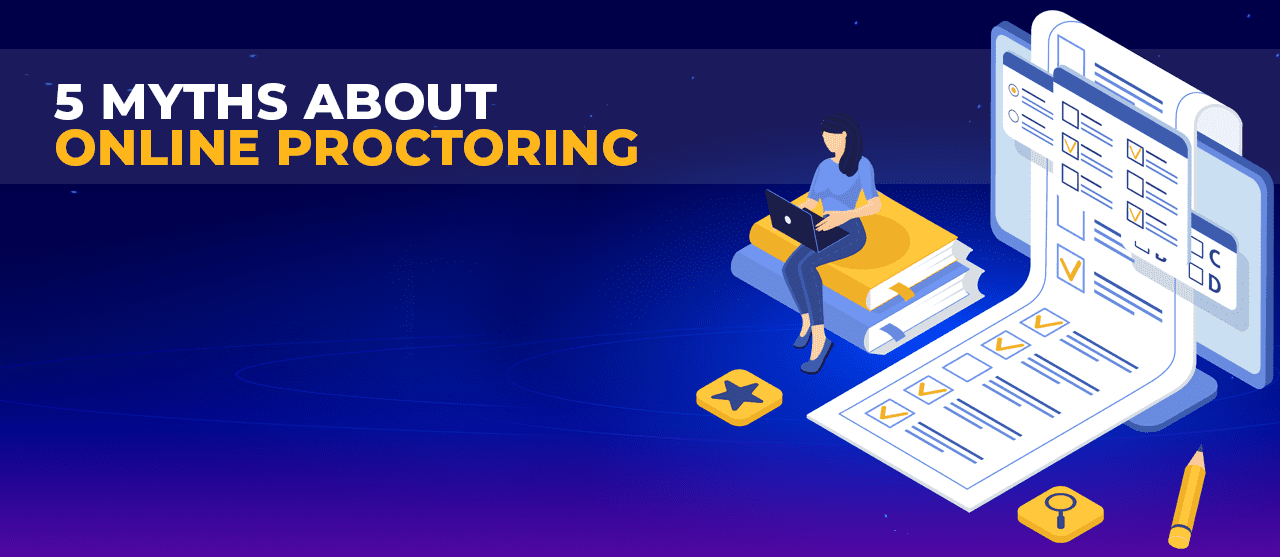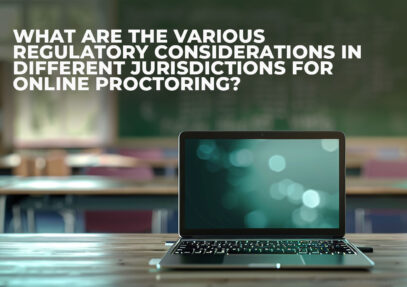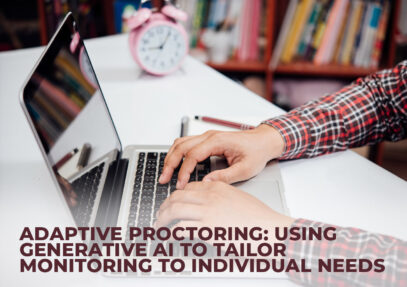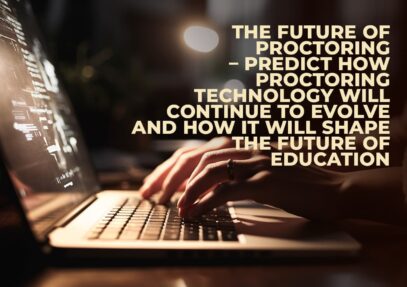
As the COVID-19 pandemic continues to impact academic institutions, more universities are switching to online modes for both learning and exam proctoring. At the same time, both students and academic leaders are expressing concerns about online proctoring like:
- How can technology possibly prevent cheating during exams?
- How can constant proctoring not affect the student’s mental health?
Isn’t video monitoring of exam candidates highly “intrusive” and “creepy?” As online exams become more common, some common myths or misconceptions have emerged. In this article, we aim to dispel 5 of the most common myths about Online Proctoring – let’s get started.
5 Myths about Online Proctoring
- Myth #1 – Constant Proctoring Increases Student Anxiety
Among the popular misperceptions advocated by technology, naysayers are that online proctoring with all its surveillance systems and proctoring tools raises the anxiety levels of exam candidates adversely impacting their performance. This is simply not true. The reality is that there are various online proctoring methods and some do not entail visual surveillance or constant monitoring of the exam candidates.
In fact, students may feel less anxious, because they are attempting the exam from their home or some other familiar and comfortable environment. As a result, some common stress factors like arriving late at the examination hall or being surrounded by other anxious students are eliminated.
- Myth #2 – Online Proctoring Infringes on Student Privacy
Another common misperception is that online proctoring infringe on the student’s privacy.
Mark Lescroart, a psychology professor at the University of Nevada, feels that “violating their (student’s) privacy is worse than leaving a potential cheater uncaught.” In addition, some students express that online proctoring technologies are “invasive, discriminatory, and inaccurate.”
These feelings are understandable because online proctoring environments do involve a human proctor (located remotely away from the student’s location) observing the student. However, even in a classroom exam setting, students are observed or monitored continuously by a proctor or assistant. In addition, many college campuses now have 24-hour surveillance cameras to record student movements and activities.
- Myth #3 – Proctors Access Student Devices After the Examination
A common claim among opposers to digital proctoring is that as a result of gaining access to the university system, online proctoring companies can access the student’s computer or device – even after they complete their exam. This has spawned a host of security concerns like technology being used to pry into the student’s private data like browsing history or private account credentials.
These concerns have even led to the publishing of the “Student Bill of Rights for Remote and Digital Work.” To address this concern, online proctoring services have enhanced their transparency by providing students with answers to questions like:
- When are they being visually recorded by the proctoring software?
- How can they uninstall the online proctoring tools after the online exam?
- What student data is being collected and monitored?
For how long do proctoring services retain the student’s data?
- Myth #4 – Every Online Proctoring Method is Video-Based
For some, the primary concern about online proctoring is video-based monitoring and recording. The myth is that all online proctoring is video-based – where exam proctors are trained to detect any suspicious behavior on part of the exam candidate including irregular head or eye movements. Additionally, video-driven proctoring requires high Internet bandwidth, thus making it unfair for students attending from remote locations with poor Internet connectivity.
- Myth #5 – Online Proctoring Can Not Detect Cheating
Recent statistics from the International Center for Academic Integrity found that 70% of university students have confirmed that they have cheated during university exams. In a recent case, Boston University has been investigating alleged student cheating using Chegg, an online subscription-based tutoring app.
Among the common misconceptions, cheating among students attending online courses is considered higher due to limited proctoring during exams. In this learning environment, online proctoring has proven effective against cheating.
Online proctoring is effective in reducing exam cheating percentages due to the continuous observation and monitoring of students by human proctors, also referred to as invigilators. In addition, advanced webcam technology and the use of Artificial Intelligence (AI) improve the detection of suspicious behavior and answering patterns relative to traditional proctoring methods.
The reality is that there are different types of online proctoring methods that can be deployed, including “record and review” proctoring where student activities during the exam duration are recorded (through screen shares or recordings) and then reviewed later by the assigned proctor.
Conclusion
In summary, the use of online proctoring services is increasing with the growth of online and independent remote learning in a COVID-impacted environment. At a time when online exams are becoming more popular, insufficient information about online proctoring methods and tools has fueled some common myths discussed in this article.
As a leading provider of online proctoring services, EnFuse Solutions is enabling global training and certification businesses and universities to cope with the challenges of the COVID pandemic. Looking for the right resources to address your online proctoring challenges? Connect with us today.
Leave a Reply
Your email address will not be published. Required fields are marked *


















Comment